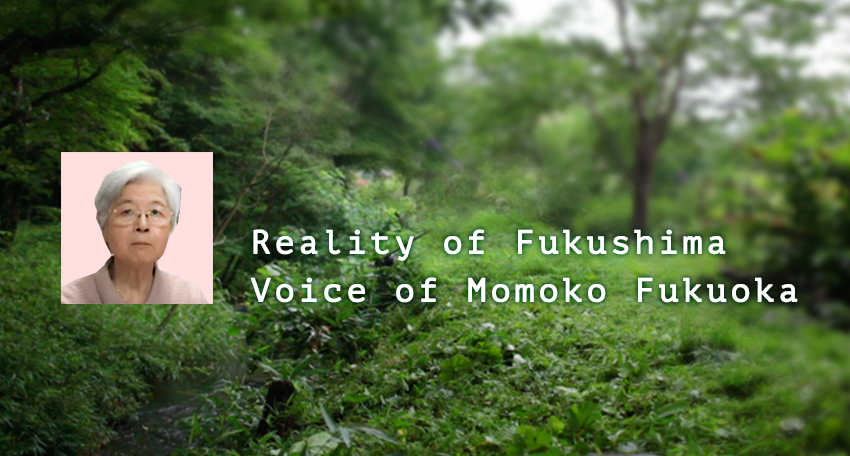
Reality of Fukushima | Voice of Momoko Fukuoka
February 9, 2020
The novel Coronavirus; 3,500 passengers are trapped on a cruise ship, suffering. We need to stand up for these victims. Can’t something be done to rescue them more quickly? I don’t mean this a political criticism, but watching the live broadcast of the National Diet just makes me want to scream: “Give priority to this emergency situation! Citizens’ lives are on the line and you should focus your debate on that!”
- Won’t keeping 3,500 people quarantined on a cruise ship with an outbreak of the novel Coronavirus just mean that everyone there will end up getting it?
- Is the Prime Minister truly committed to helping these individuals being held against their will? Why doesn’t he tackle the problem personally, like Junichiro Koizumi would? The families being held on the ship are elderly and running out of time. I ask that something please be done soon.
- Many people have still not recovered from last year’s typhoon. Some houses are destroyed while others have leaks. Many are still suffering financially and unable to repair their homes. Citizens of this country are still reeling from news about the government funds spent on the Cherry Blossom Party (a scandal involving frivolous government spending). Shouldn’t some of that government money go as aid to help our country’s citizens?
[Fukushima Nuclear Disaster Victims: Their Progress and their Current Situation]
March 11th, 2020 marks 9 years since the disaster. Next year will be the 10th anniversary. For the affected people of Fukushima, these years have been difficult.
“Nuclear reactors are fine. No need to worry for your safety.” The government and TEPCO responded to the public’s worries by reassuring them with a myth about nuclear safety. And so, the public came to believe that a nuclear accident could never happen.
- I believe that this nuclear power plant was stared up through a government policy. Despite this, the government hasn’t taken any responsibility for the aftermath of the accident at all. They’ve left the matter of reparation payments up to TEPCO. The problem of physical exposure to people and contamination in the disaster-affected areas, contamination throughout the country, the pain and struggles of those still living as evacuees, guarantee of standards of living; the government has been completely hands-off with decisions about all these problems. They have put the responsibility of coming up with solutions on local city, town, and village mayors. These local mayors are affected by the disaster as well. I can’t believe they would put someone who is still personally not out of harm’s way in charge of managing disaster response. I feel that the government should take charge when there is a national emergency.
- It was the national government that decided to award reparation money purely by distance from the TEPCO reactors (anything within 20km), rather than by radiation level at each location. Why didn’t they determine reparations based on actual contamination levels? They must have known the decision would separate relatives and friends, inviting arguments and division. I think cases are being brought to court as a result of this decision.
- It was also the government who decided to use a lottery to determine who would live in temporary housing and recovery housing units, rather than deciding by neighborhood. Why did they do it by lottery? This system separates the affected people from their neighbors, friends, and relatives. I want people to know that this has caused great loneliness for many affected people. Local festivals and neighborhood gatherings can no longer be held.
- Currently, the government says a dosage of up to 20 microsieverts is okay. The evacuation order was lifted, so the affected people have started returning home. The elderly are going back with an attitude of: “I’m tired of this. I’m going to die anyway, so I’d at least like to die at home!”
- At the temporary housing units, there have been quite a few people who have hanged themselves. When one group of disaster-affected people went to look for the president of the local neighborhood association, they found him hanging inside one of the sheds of the housing units. I have heard many stories like this.
- This is what one person from Kawauchi village told me: “My friends who returned home have been dying one after another. The village is already so empty. I had friends die both yesterday and today. It’s terrible. I’m so lonely.” Kawauchi is a mountain village, so this might be happening because it’s the cold season.
- One elderly returnee I talked to said her monthly pension was 30,000 yen (about $280 USD). “My husband fell ill and was unable to pay into his pension,” she said.
- “Our farming implements rusted during the long evacuation period, we are weak and no longer able to grow our own vegetables.” The woman is somewhere in her 80’s or 90’s. “Before the disaster, we grew our own vegetables, ate fish we caught in the river, and drank river water. We didn’t have to spend money. But, I can’t do those things anymore. Everything costs money now. It’s a real problem.”
Currently, in Japan, the government pension for us housewives is 50,000 to 60,000 yen. You can’t live on that. Can’t the Prime Minister do something about this? If an elderly woman outlives her husband, her livelihood vanishes instantly. This is how things are right now in Japan.
Please help support the people of Fukushima. Please send a gift of donation out of the kindness of your heart.
Momoko Fukuoka
English translation: Karen Rogers
Editing: Rachel Clark
